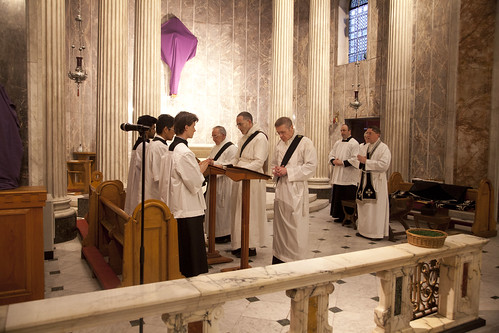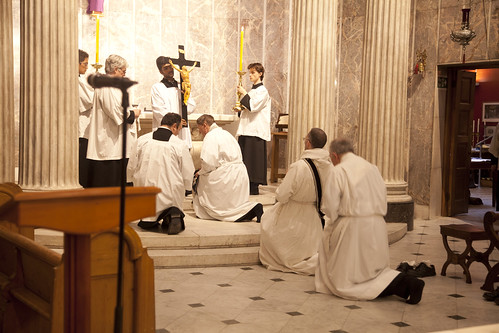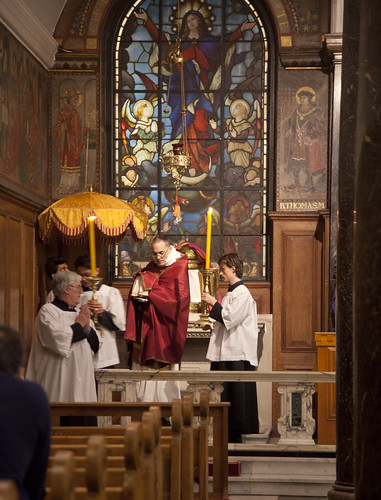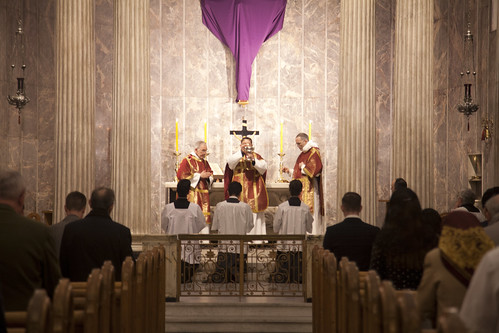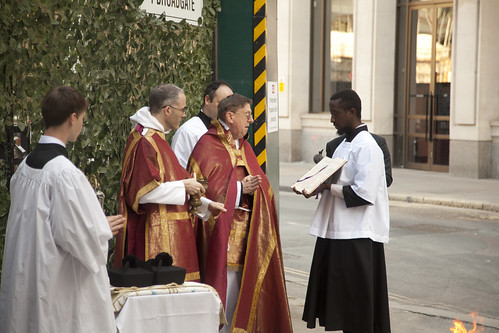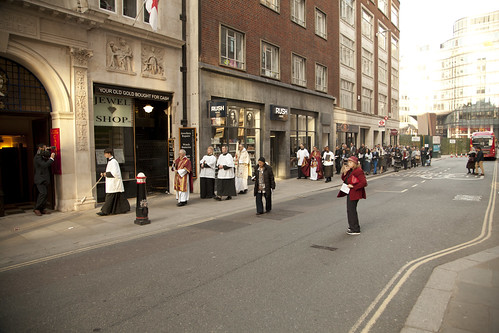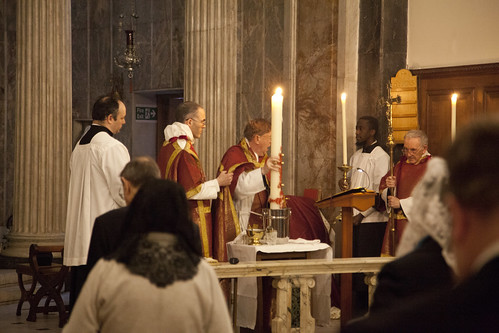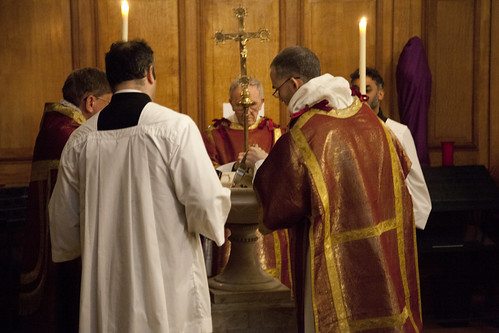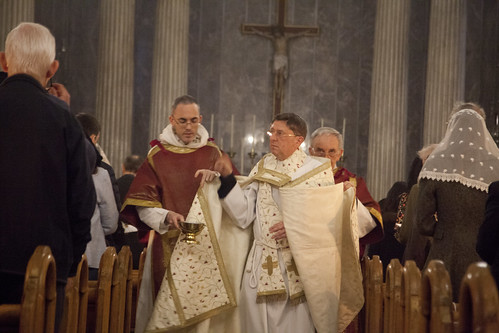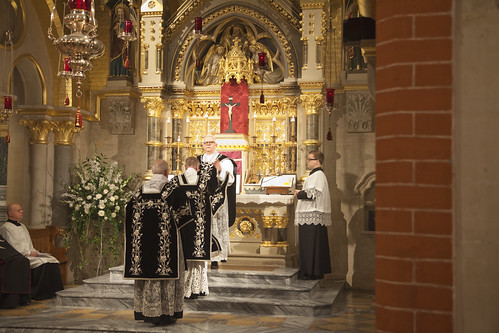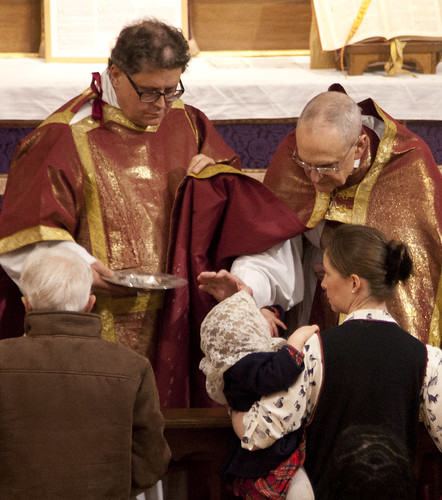Chairman's Blog
Liturgy and the War in Ukraine: Inside the Vatican
Good will implies that we take the religious values of the region seriously. The liturgical debate taking place in the Western Church, particularly after Traditionis Custodes, can leave one with the impression that the Western Catholics, at bottom, see the whole phenomenon of the Eastern Rites as faintly ridiculous, and accordingly that disagreements among their different groupings is little more than a squabble among foolish children. This impression will not be dispelled until the Holy See has made its peace with its own liturgical tradition, and gives it the place of honour which Pope Benedict XVI hoped for it, and from which Pope Francis has tragically plucked it.
Support the Latin Mass Society
Triduum Photos
More mischevious nonsense from The Pillar
April 14th this year was Maundy Thursday. It is an interesting day for The Pillar to choose to publish a shoddy attack on two Catholic intellectuals, Prof Thomas Pink and Fr Edward Waldstein, for their alleged 'integralist' views, in an interview by Charlie Camosy with Joseph Capizzi.
Plant the critique out there in public, on the day in the year the victims are least likely to notice it quickly or react before the social media circus has moved on. Better still, if someone--like me--does notice and uses Twitter to call on the Pillar's editors, J.D. Flynn and Edward Condon, to account for it over the following 24 hours, they can just piously not react for the duration.
So here I am drawing attention to this interview once again. I happen know the targets of this piece. Prof Pink is a Patron of the Latin Mass Society. I know Fr Waldstein a little from the Roman Forum Summer Symposium. There are a great many would-be lay intellectual leaders of the Catholic world, and the field is quite crowded even if you focus on the Traditional Catholic niche, but Prof Pink and Fr Waldstein are the real thing: they are established and respected academics who are orthodox Catholics and engaged in some of the fundamental issues of the day. Prof Pink is one of the foremost Catholic intellectuals in the UK.
Accordingly, I suppose it is not surprising that they should be the focus of asinine criticisms. Towards the end the interviewer Camosy tries to draw in a gaggle of other names into the discussion, but Capizzi doesn't really rise to the bait.
The major figures seem to be primarily online, as I haven’t seen much of their work in standard theological journals. The two (English-speaking) who jump first to mind are Thomas Pink and Edmund Waldstein.
I take their central claim to be that, just as man has two ends, spiritual and temporal, and that man’s temporal end is ordered to his spiritual end, so must the juridical authorities of the world be hierarchically ordered: the temporal juridical authority to the spiritual juridical authority.
In other words, the state should be subordinate to the Church. Relatedly, then, any political order is deficient to the degree it fails to seek this hierarchization of juridical authorities, or denies the existence of the spiritual juridical authority. Thus, “liberalism” must be rejected if and when it denies such ordering — or the existence of the spiritual juridical authority.
59. Men, however, composed as they are of bodies and immortal souls, can never in this mortal life succeed in satisfying all their needs or in attaining perfect happiness. Therefore the common good is to be procured by such ways and means which not only are not detrimental to man’s eternal salvation but which positively contribute to it.
The Church and the political community in their own fields are autonomous and independent from each other. Yet both, under different titles, are devoted to the personal and social vocation of the same men. The more that both foster sounder cooperation between themselves with due consideration for the circumstances of time and place, the more effective will their service be exercised for the good of all. For man's horizons are not limited only to the temporal order; while living in the context of human history, he preserves intact his eternal vocation.
Monday Masses in London
- 2nd May: St ATHANASIUS
Missa Euge Bone, Tye
Surrexit Pastor Bonus, L’Heritier
Dum Transisset, Taverner
- 23rd May: VOTIVE MASS FOR PEACE
Missa Vidi Speciosam, Victoria
O Maria Vernans Rosa, Clemens non Papa
Christe qui Lux est Dies, White
- 6th June: WHIT MONDAY
Missa Dum Complerentur, Palestrina
Dum Complerentur, Victoria
Loquebantur Variis Linguis, Tallis
- 20th June: Octave Mass of CORPUS CHRISTI
Missa Viri Galilei, Palestrina
Viri Galilei, Palestrina
O Sacrum Convivium, Guerrero
- 4th July: Octave Mass of SS PETER AND PAUL
Missa Papae Marcelli
Credo Quod redemptor, Parsons
Adolescentes sum ego, Mundy
- 25TH July: St JAMES
Missa Simile Est Regnum, Victoria
Sancta Maria, Victoria
Ave Verum, Byrd
- 15th AUGUST: THE ASSUMPTION OF THE BVM
Missa Assumpta Est Maria, Palestrina
Ave Virgo Sanctissima, Guerrero
Ave Maria Gemma Virginum, Mouton
- 22nd August: THE IMMACULATE HEART OF THE BVM
Missa Sicut Lilium Inter Spinas, Palestrina
Ave Maria 5, Palestrina
Salve Regina a 5, Victoria
FIUV Magazine, Gregorius Magnus, now out!
Support the Latin Mass Society
Sponsorship for Royal School of Needlework Course from the Guild of St Clare
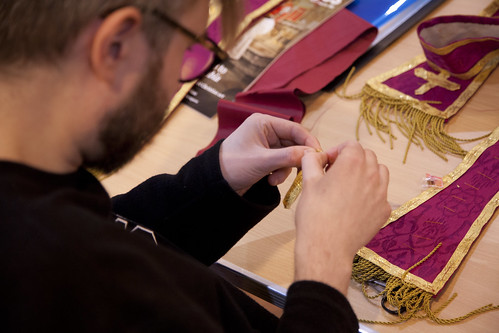 |
| One of our sponsored students, helping to make a replacement stole for a violet Low Mass set belonging to the Latin Mass Society |
 |
| A Certificate Course piece of work by the other of our current sponsored students. |
A prayer for Friday's Consecration of Russia
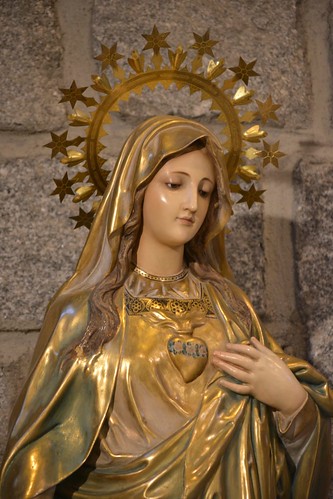 |
Prayer of Consecration to the Immaculate Heart of Mary
O Queen of the most holy Rosary, help of Christians, refuge of the human race, victorious in all the battles of God, we prostrate ourselves in supplication before thy throne, in the sure hope of obtaining mercy and of receiving grace and timely aid in our present calamities, not through any merits of our own on which we do not rely, but only through the immense goodness of thy mother’s Heart. In thee and in thy Immaculate Heart, at this grave hour of human history, do we put our trust; to thee we consecrate ourselves, not only with all of Holy Church, which is the mystical body of thy Son Jesus, and which is suffering in so many of her members, being subjected to manifold tribulations and persecutions, but also with the whole world, torn by discords, agitated with hatred, the victim of its own iniquities.
Be thou moved by the sight of such material and moral degradation, such sorrows, such anguish, so many tormented souls in danger of eternal loss! Do thou, O Mother of mercy, obtain for us from God a Christ-like reconciliation of the nations, as well as those graces which can convert the souls of men in an instant, those graces which prepare the way and make certain the long desired coming of peace on earth. O Queen of peace, pray for us, and grant peace unto the world in the truth, the justice, and the charity of Christ.
Above all, give us peace in our hearts, so that the kingdom of God may spread its borders in the tranquillity of order. Accord thy protection to unbelievers and to all those who lie within the shadow of death; cause the Sun of Truth to rise upon them; may they be enabled to join with us in repeating before the Saviour of the world: “Glory to God in the highest, and on earth peace to men of good will.” Give peace to the nations that are separated from us by error or discord, and in a special manner to those peoples who profess a singular devotion toward thee; bring them back to Christ’s one fold, under the one true Shepherd. Obtain full freedom for the holy Church of God; defend her from her enemies; check the ever-increasing torrent of immorality; arouse in the faithful a love of purity, a practical Christian life, and an apostolic zeal, so that the multitude of those who serve God may increase in merit and in number.
Finally, even as the Church and all mankind were once consecrated to the Heart of thy Son Jesus, because He was for all those who put their hope in Him an inexhaustible source of victory and salvation, so in like manner do we consecrate ourselves, and the nations of Russia and Ukraine, forever to thee also and to thy Immaculate Heart, O Mother of us and Queen of the world; may thy love and patronage hasten the day when the kingdom of God shall be victorious and all the nations, at peace with God and with one another, shall call thee blessed and intone with thee, from the rising of the sun to its going down, the everlasting “Magnificat” of glory, of love, of gratitude to the Heart of Jesus, in which alone we can find truth, life, and peace.
(Pope Pius XII, 17 Nov 1942: with the addition of the words in red).
Penance: for Catholic Answers
Presented with the imperative to “do something” for Lent, a familiar response is to “give something up.” In itself, this is a healthy enough instinct. Depending on your lifestyle, giving up alcohol, or even chocolate, can be a reminder of the nature of the season and a noticeable sacrifice. Alternatively, people think of giving up something bad, trying to overcome a habitual sin. This is laudable, but penance is the sacrifice of something good, not something bad. Catholics should be able to go beyond both kinds of “giving up.”
The imperatives of Lent in particular, and of the Christian life in general, are the eminent good works of prayer, penance, and almsgiving. These really are good works—works that earn us merit. These works will cancel out temporal punishment we would otherwise suffer in purgatory, and add to our glory in heaven, and we can offer them for the good of the holy souls in purgatory and for the conversion of sinners. Good works in this sense are possible only if we are in a state of grace (sanctifying grace), and they will themselves be done in and through God’s assisting grace (actual grace). When we do them, we may say with St. Paul, it is not we who do them, but God who does them through us (Phil. 2:13). They are in fact a gift of God to us—but when God gives us something, we really do possess it.
Server training and vestment-mending in London
We had a splendid day at St Mary Moorfields with the Society of St Tarcisius (server training) and the Guild of St Clare (vestment mending), taking place simultaneously.
The 'Latin Mass' Society: letters in The Tablet
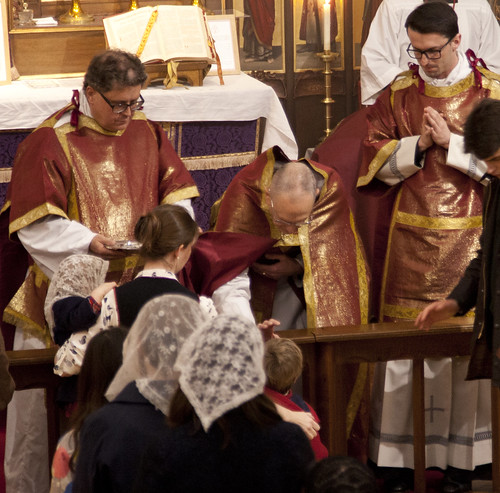 |
| Ash Wednesday. A new generation of Latin Massers. |
Although printing two letters challenging the Latin Mass Society directly, The Tablet took their time in printing my response, which appeared two editions ago (yes I've been busy too). It is the old canard about our name. The Latin Mass Society is a lot easier to understand than a few other names I could mention. The Tablet, for example: what is that all about? Did its founders really look forward to the day when it would be referred to a 'the Bitter Pill'?
Letters on 4th Feb
...While not quite accurate, it does not seem entirely misleading to speak of two rites. What is misleading – and completely inaccurate – is to refer to the “extraordinary” form as the “Latin Mass”. I find it frankly annoying that the term “Latin Mass” is so frequently used in this way, and has been adopted as a rallying cry on both sides of the current, unfortunate, liturgical conflict.
What is at issue is not only, and certainly not primarily, the use of Latin. All the post Vatican II liturgical texts – for the celebration of Mass and the sacraments, the daily Liturgy of the Hours, for ritual consecrations and blessings – were promulgated in Latin. Latin may be, and is, the language in which these rites are celebrated if and when it is appropriate to do so.
Latin is not the root cause of today’s liturgical polarisation. Please, let us agree to avoid this confusing use of the term “Latin Mass”. And, in passing, perhaps the Latin Mass Society (which I do not support, despite a personal love of Latin as a liturgical language) might consider changing its name, to represent more accurately what appear to be its own aims and ethos.
(FR) MARTIN J. CLAYTON
HOPE, DERBYSHIRE
...The congregation was mixed: English, Irish, Swiss, German. Although the form of the service was post-Tridentine as prescribed by Vatican II, the language was Latin.
JIM MALIA
TOTLAND BAY, ISLE OF WIGHT
My response.
Fr Clayton and Jim Malia (Letters, 5th Feb) are correct that the Mass loved by ‘traditional’ Catholics is not simply the Mass in Latin.
The Latin Mass Society was founded to preserve the ancient Mass in Latin, when it began to be celebrated in the vernacular in 1965, and continued to seek the preservation of the ancient Mass in Latin, when it disappeared more or less completely in 1969.
Like the names of many organisations, ours reflects the circumstances of our foundation, but it remains universally understood.
The reformed Mass has never been widely celebrated in Latin. It would be pointless to make the rites ‘short, clear’ and ‘within the people's powers of comprehension’ (Sacrosanctum Concilium 34) if, at the same time, ‘the use of the Latin language is to be preserved in the Latin rites’ (36). The inner conflict in Vatican II’s Decree on the Liturgy has been resolved, in practice, in favour of the vernacular: to pretend otherwise is to engage in make-believe.
Joseph Shaw
Chairman, The Latin Mass Society
Support the Latin Mass Society



